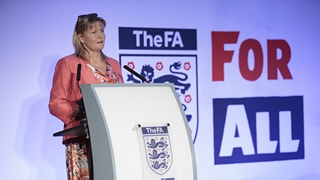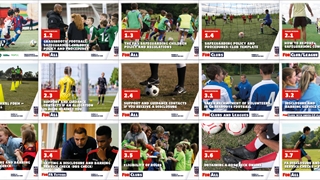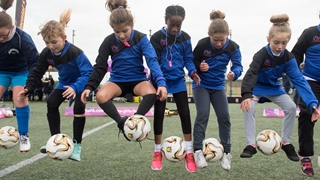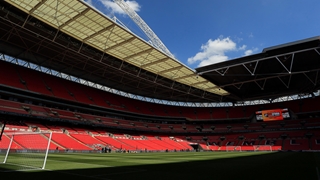
Ahead of Play Safe Weekend 2023 across Saturday 30 September and Sunday 1 October, we sat down with our head of safeguarding Sue Ravenlaw to find out what to expect during the weekend and why everyone should get involved.
Hi Sue, firstly, can you tell us a bit about your role and why safeguarding matters to you?
My job as FA head of safeguarding is wide ranging and the team’s work spans right across the English game, within the FA itself, across our England teams, the women's professional game and grassroots football. We work in close collaboration with a number of different stakeholders across every aspect of the game, from grassroots to elite, to ensure that safeguarding policies and practices are implemented to the highest standards and are as robust as possible. We also work very closely with our case management team at the FA, which is comprised of safeguarding professionals who importantly, lead investigations and risk assessments into anyone who may pose a risk of harm to children or adults at risk.
Safeguarding is vitally important because, at its core, it's the right thing to do. As we create opportunities for football to be played, then we must do all that we can to ensure that the environments in which those opportunities are played, result in safe and positive experiences, which have children’s best interests at the heart of them.
Simply put, it's a core part of our responsibility as a governing body, to ensure that participants, particularly children, young people and adults at risk, are safe and that adults are looking out for their welfare.
Watch.
— England Football (@EnglandFootball) September 24, 2023
Talk.
Listen.
Play your part and make your #PlaySafe pledge 👊
Tell us some more about what’s happening this weekend for Play Safe?
The Play Safe campaign is in essence very simple. We are promoting awareness of the importance of safeguarding in football and highlighting the role that everyone can play in creating an ever-safer culture around the game. The campaign, which is in its third year now, is led by the FA and endorsed by the NSPCC and supported across every level of English football.
Across the game this weekend, clubs and organisations will be showing their support for safeguarding. In the grassroots game you will see youth team captains wearing Play Safe armbands and importantly, that creates a conversation within the club. You'll see lots of social media activity, with clubs showing their support in different ways and engaging positively with children, parents and coaches, and having those important conversations.
In the professional game you’ll also see support across both men’s and women’s football, with managers wearing Play Safe pin badges to raise visibility of safeguarding and increase awareness. It promises to be a fantastic weekend for highlighting this important part of our game.
How can people pledge their support to Play Safe?
This season we're asking everyone, everywhere – clubs and leagues at every level of the game, (and individuals if they wish) – to tell us what they are planning to do to make a difference over the Play Safe weekend on 30 September and 1 October and to share this via an online Play Safe Pledge. We’re delighted that so many grassroots youth club captains up and down the country will be wearing Play Safe armbands, alongside coaches who will be wearing Play Safe pin badges, and it’s pleasing to see so many clubs supporting the campaign across social media in the lead up to the weekend.
You can sign up and make a pledge to support Play Safe weekend and tell us about your planned activities here.
Why is it important parents are informed about safeguarding?
We recognise that parents are hugely important in supporting this campaign, as they play a massive part in their children's lives. We want parents and carers to understand what they should expect when they bring their children to football, the kind of things that they should see and hear within a club or football setting, and really importantly, the things they might notice if things aren't going so well. It's about informing parents and making sure that they feel like they can play their full part within the football setting as well as in the family setting and know how to escalate any concerns or issues if they arise, through the leagues, County FAs and the FA.
Can you tell us some more about the Safeguarding Awareness Course for Parents and Carers which is being promoted as part of Play Safe this weekend?
This year we are encouraging people to take our Safeguarding Awareness Course for Parents and Carers which helps in making an informed choice about the football setting parents enrol their children in. The free course guides parents and carers through questions they should ask to ensure the club or venue where children play football has the correct safeguarding policies, people and practices in place.
We've had brilliant feedback from parents and carers who have taken the course and we want to reach as many people as we possibly can to enable them to feel more empowered around safeguarding and what they should expect around their experience for their children.
The course is free and takes around 30-40 minutes to complete. It can be found on our England Football Learning website here.
How does safeguarding work across the FA and County FAs?
Embedding safeguards has to happen at every level. That requires leadership at every level and an understanding of why it's important - from grassroots clubs to the elite level of the game, through to the FA Board and everything in between.
In terms of standards, that requires us to ensure what we ask of clubs is very clear. We're trying to make it as simple as possible for them to understand the requirements that they must have in place, as well as constantly educating them to drive a positive culture within their settings.
We’ve also worked hard to ensure that across the FA, the 50 County FAs and two National School Associations, we have a set of standards that means from Cornwall to Cumbria, County FAs are looking out for the same things, and all meet the same standards. At every level there's a minimum standard of what people should be doing, and this helps to drive the right culture.
The introduction of independent assessments for County FAs which we've been doing for many years now has also driven positive change, resulting in massive ownership across the system, increased confidence in people in different roles across County FAs, and a wider understanding of what effective safeguarding looks, feels and sounds like.
This level of work is also going on across the professional game, driven by the Premier League and EFL, as well as through the Barclays Women’s Super League and Barclays Women’s Championship.
And finally, what would your message be to anyone playing football this weekend and supporting the Play Safe campaign?
Have a great time, enjoy and understand that safeguarding is important every day. It’s the little things we can all do every day that helps to creates a fun, positive and safe culture for all. Thank you for supporting the Play Safe campaign!









